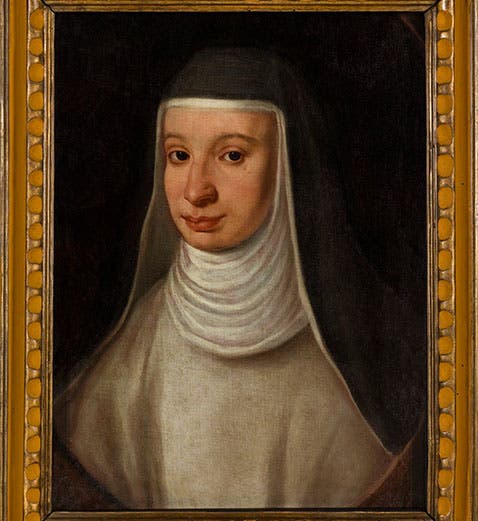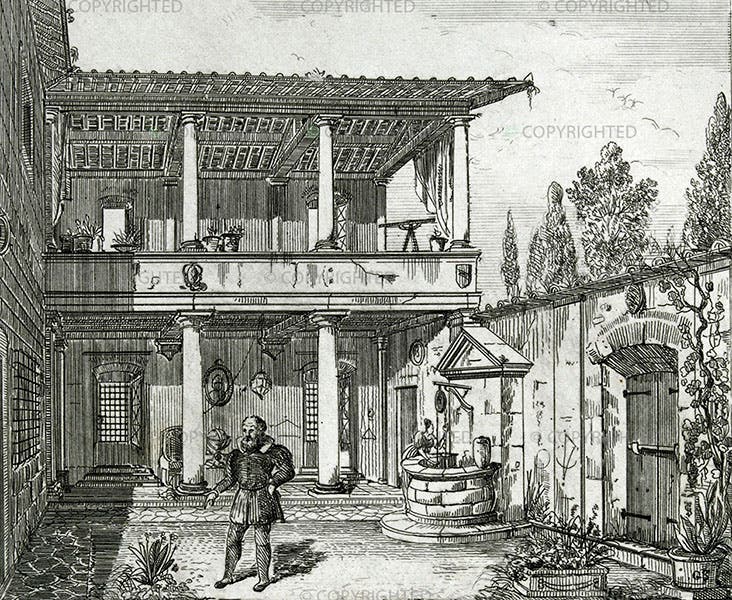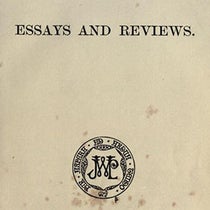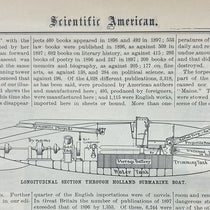Scientist of the Day - Suor Maria Celeste
Suor Maria Celeste, nee Virginia Galilei, was “born of fornication,” according to the San Lorenzo parish registry, in the city of Padua, on August 13, 1600, and baptized the following week. Identified only as “Virginia, daughter of Marina from Venice,” the infant was also the daughter of Galileo Galilei, a professor at the local university, who named her for his sister, and considered her his own.
Soon after her ninth birthday, Virginia left Padua for Florence with her grandmother, Giulia Ammannati Galilei. Her father and younger sister, Livia, followed a year later. Galileo, newly famous as the author of a wildly popular book about his telescopic discoveries, The Starry Messenger, had procured a prestigious position as philosopher in the court of Cosimo II de’ Medici.
It is possible that the child Virginia attended Galileo through the autumn and early winter of 1610, as he puzzled over the problem of Saturn, which appeared “triple-bodied,” and of Venus, which changed size and shape like the Moon. She was intimately familiar with her father’s wide-ranging interests by 1623, when she wrote the first of the 124 surviving letters that reveal nearly all of what is known of her life, and which are published in volumes 13-15 of Galileo’s Opere.
Within three years of Galileo’s arrival at the Florentine court, when his notoriety drew dangerous criticism from a firebrand priest, he sent both his daughters to live at the Poor Clare Convent of San Matteo in nearby Arcetri. At 13 and 12, the girls were too young to profess religious vows. Instead, they took instruction from the nuns, adopted the dark brown habit of the Franciscan orders, and were indoctrinated into the religious rule of poverty, chastity, and obedience. They watched some of their companions in similar straits reach the canonical age of 16 and leave the convent for an arranged marriage. But on October 4, 1616, the feast day of St. Francis, Virginia let go of her given name in favor of Suor Maria Celeste. The next year Livia did the same, to become Suor Arcangela. They both spent the rest of their lives at the convent in what St. Clare called “holy enclosure.”
Intelligent and industrious, Suor Maria Celeste developed an expertise in medicine, aided in part by the physicians who visited the sick nuns in the infirmary, and also by her own research, experimentation and experience as the convent’s apothecary. In her regular exchanges with Galileo, she often requested small gifts or sums of money, whether for herself, the silent Suor Arcangela, or one of the other sisters. In return, she made pills and tonics to treat his various ailments, including numerous preventatives against the plague, and counseled him about the health consequences of over-indulging, as he often did, in red wine.
In one letter she chided him that he had forgotten to send the telescope, and asked him to please put it in the basket next time, but this is her only reference to the instrument over the ten-year period covered by her extant letters.
Of particular help to Galileo was her willingness to manage his important paperwork. He sent her drafts of letters to the likes of Prince Cesi, founder of the Lyncean Academy, or dignitaries in the Medici or papal courts, and she copied them over in her neat hand. In November of 1629, when Galileo was completing his Dialogue on the Two Chief Systems of the World, she apparently copied and assembled the various sections of the lengthy manuscript for the printer.
The publication of that magnum opus precipitated Galileo’s trial by the Roman Inquisition, as well as the banning of the Dialogue, which remained on the Index of Prohibited Books for two centuries.
Ever loyal to Galileo and in constant correspondence with him throughout his ordeal, Suor Maria Celeste assumed the part of his penance that required the repeated recitation of the penitential psalms.
Soon after Galileo returned home in 1634, to live out his remaining years under house arrest, Suor Maria Celeste died of a sudden illness. “I had two daughters who were nuns and whom I loved dearly,” Galileo wrote in his grief to a correspondent in Paris, “but the eldest in particular, who was a woman of exquisite mind, singular goodness, and most tenderly attached to me.”
Dava Sobel is the author of Longitude, Galileo’s Daughter, and, most recently The Glass Universe. Her translations of all of Suor Maria Celeste’s letters were published in Letters to Father (Walker 2001, Penguin 2002).







